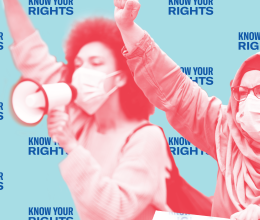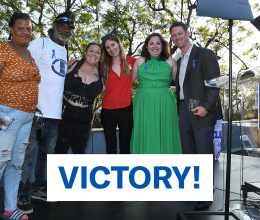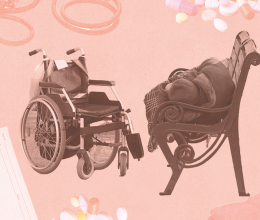Everyone deserves a safe place to call home, including our unhoused neighbors and loved ones.
But jurisdictions across California are endangering unhoused people by criminalizing them for simply being unhoused. Legal advocates are fighting back with a new guide from UCLA School of Law Veterans Legal Clinic and the ACLU Foundation of Southern California, which will equip legal services providers, public defenders, and other advocates with a practical introduction to representing unhoused individuals against criminal infraction charges.
READ THE CITATION DEFENSE GUIDE FOR UNHOUSED CLIENTS (.PDF)
This guide responds to a wave of hostility toward unhoused community members across California. Instead of providing unhoused people with accessible, appropriate housing, certain jurisdictions target them with arrests, exorbitant fines and criminal punishment for basic life activities like sleeping and lying down. This trend accelerated in the wake of Johnson v. City of Grant’s Pass—a U.S. Supreme Court decision ruling that punishing unhoused people who have no alternative to sleeping outside is not cruel and unusual punishment under the Eighth Amendment. Governor Gavin Newsom’s executive order directing the destruction and displacement of unhoused people’s camps also furthered this trend of inhumanity. Unhoused individuals now face aggressive police enforcement of local laws that criminalize their everyday necessities, like sleeping in public, sitting and lying down in public areas, sharing food and keeping their property with them.
Unhoused people can accumulate infraction charges—the type of charges addressed by this guide—simply by trying to meet their basic need for food, sleep and shelter. Infractions can come with fines of up to $1000 per offense. This scheme funnels our state’s poorest and most vulnerable individuals into the criminal legal system. It disproportionately affects people with disabilities, who face additional hurdles in complying with anti-houselessness laws and responding to any infractions. The only true solution to houselessness is increasing affordable and accessible housing, protecting renters from becoming unhoused and offering voluntary, appropriate services.
"Make no mistake—criminalization only punishes and further destabilizes individuals with no other alternatives, and we stand against it."
Despite the outsized impact on unhoused individuals and the indigent, there is no right to a state-provided attorney to defend against criminal infractions. Often, unhoused individuals must represent themselves in an informal traffic court setting, even though they may be unable to leave their property unprotected to spend time in court and lack the resources to get themselves to court. As a result, citations often go unaddressed, leading to additional fines and penalties and further exacerbating the problem of houselessness.
This new guide addresses this legal gap, equipping law students and attorneys with a practical introduction to addressing infractions for unhoused clients. It covers best practices for working with unhoused people, navigating traffic court, challenging citations and contesting exorbitant fines and fees. The guide will empower legal advocates to fight the criminalization of houselessness and poverty. Make no mistake—criminalization only punishes and further destabilizes individuals with no other alternatives, and we stand against it.





